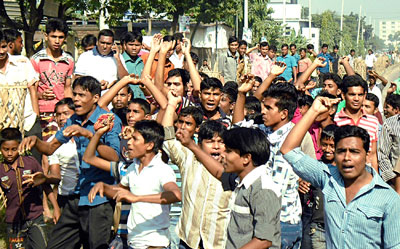

Vol. 77/No. 44 December 9, 2013

|
| Reuters |
| Bangladeshi government announced Nov. 21 it will raise minimum monthly wage from $38 to $68 in December, following six months of mobilizations by garment workers demanding 170 percent wage increase and safer working conditions. Above, garment workers in Gazipur rally Nov. 13. Two workers were killed in clashes with cops during strike of some 10,000 Nov. 18-19. |
“This is a substantial raise,” Alonzo Suson, director of the Bangladesh Solidarity Center, said Nov. 25 in a phone interview from the capital Dhaka. “But it’s still the lowest wage of all big garment producers, it’s still a starvation wage. Manufacturers really oppose any increases, they promote the industry as the one with the lowest labor costs in the world. They don’t want to lose this argument for investment in the country.”
The government approved the new wage of 5,300 taka ($68) a month on Nov. 21 after the Garment Manufacturers Association agreed to the raise. When the proposal was made public Nov. 4 bosses opposed it, saying they would not accept anything higher than 4,500 taka ($58).
Strikes, demonstrations and rallies intensified in response. Hundreds of factories were forced to shut down the following two weeks as workers took to the streets. From Nov. 18 to 19 at least 10,000 workers in Ashulia and Gazipur, two industrial belts north of Dhaka, walked out, forcing bosses to shut more than 200 plants. Cops killed two workers and injured at least 100 in clashes Nov. 18.
Rubber bullets, water cannons and tear gas fired by the police failed to break up the demonstrations. Bangladesh has a 2,900-strong special Industrial Police Force set up in 2010 in the midst of monthslong actions by the workers that forced the government to raise the minimum wage to 3,000 taka ($38). The government has deployed paramilitary border guards to assist the police.
“We’ll comment when we get the agreement in writing from the government,” Babul Akhter, president of the Bangladesh Garment and Industrial Workers Federation, told the Militant Nov. 25. “We were promised this in June, in November and now in December. So we’ll see if it actually happens this time.”
Both Suson and Akhter said protests have subsided the last week after the agreement was sealed.
Garment union federations have been unified in the demand for a minimum wage of 8,000 taka ($103) and say 5,300 taka is still way too low.
“We say this is what we need,” Amirul Haque Amin, president of the National Garment Workers Federation said by phone Nov. 11. “Workers can’t live on 5,300 with rents and prices going up. And the 77 percent increase is for unskilled workers, but for skilled operators it is less. We demand the same increase for them.”
“If the higher wages don’t come through this time either, workers will be very, very angry,” Akhter said.